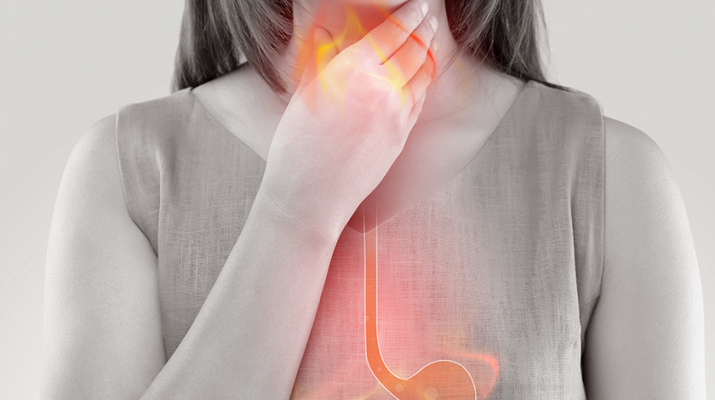Dietary changes and even surgery are indicated to treat this condition — also known as the ‘silent reflux’
By Deborah Jeanne Sergeant

Gastroesophageal reflux disease (GERD) causes acid and food in the stomach to go back into the esophagus. That happens when the lower esophageal sphincter opens when it shouldn’t. Patients suffer pain, sore throat and heartburn severe enough that the sensation even reaches the mouth.
“If someone has chest pain as their chief complaint, they should rule out cardiac issues as the first thing,” said physician Kenneth Eckhert, a surgical partner at Surgical Associates of Western New York in West Seneca.
Atypical heartburn, called “silent reflux,” can cause sinusitis, cough and chest discomfort. Beyond the uncomfortable symptoms, ongoing exposure to acid can cause lasting damage and even cancer.
“If it’s an acute problem, they may get screened,” Eckhert said. “If it goes on for days or weeks, they look into the cause. A lot of symptoms can mimic each other. A lot of these workups overlap.”
Endoscopy can lead to a diagnosis and then treatment options.
For people who have a high acid load, medication can help control it. Lower potency acid reducers are available over-the-counter and higher potency by prescription. Proton pump inhibitors are another type of medication prescribed to hamper the final step of acid production in the stomach.
Long-term side effects from that medication can include decreased calcium absorption, diarrhea, abdominal pain and headache.
Other interventions can help.
“Years ago only the most severe cases would be surgical,” Eckhert said. “The new procedures are driving people to seek surgical intervention sooner. The main focus is to recreate the junction between the esophagus and the stomach. That’s what’s failing and causing the reflux.”
The newest procedures boast an 85 percent success rate, where patients no longer experience symptoms and don’t need medication either.
“These are long-term successful solutions for patients with severe reflux and those who want to come off medical management,” Eckert said.
For less severe cases, Mary Jo Parker, registered dietitian with Nutrition & Counseling Services in Williamsville, encourages patients to try dietary adjustments for relief.
Foods to limit include acidic items like citrus, tomatoes and sauce, and coffee. Spicy foods like hot peppers and sauces can also irritate the system. High fat foods like fried foods, many kinds of nuts, nut butters, added fats and fatty meats can also prove bothersome, as can mint, garlic and onions, caffeine, carbonated beverages, wine and sometimes other types of alcohol.

“Those are the basic recommendations,” Parker said. “Some people can tolerate some of the above foods in moderation. Some people have idiosyncratic reactions to other foods or ingredients as well, but these are the common offenders.”
In addition to dietary changes, Allyson Odachowski, registered dietitian with Custom Dietetics in Buffalo, advises patients with GERD to make lifestyle changes.
“Small, frequent meals are tolerated better than a few large meals,” Odachowski said.
She also advises overweight people to trim down, as carrying too much weight can worsen GERD. Wearing looser clothing and quitting smoking can also help reduce the effects.
Eating meals slowly may also help.
“Sit down and eat,” she said. “Don’t eat on the fly. We need an environment that supports digestion.”
Odachowski wants patients to wait three hours after eating before lying down. She also said that raising the head of the bed nine inches can keep acid where it belongs.
“Beyond the common foods that irritate foods with GERD, each person has to figure out and explore what else can irritate them with food by logging and noticing how they feel between meals,” Odachowski said.
To generally improve digestion, she wants people to eat more probiotic foods, including kimchi, kombucha, yogurt, kefir, and fermented pickles and other vegetables.
“Having good bacteria — probiotics — helps keep the whole system working the way it’s supposed to. This is a piece of it most people miss. We don’t eat a lot of foods that are good sources of probiotics. A probiotic supplement can help.”

